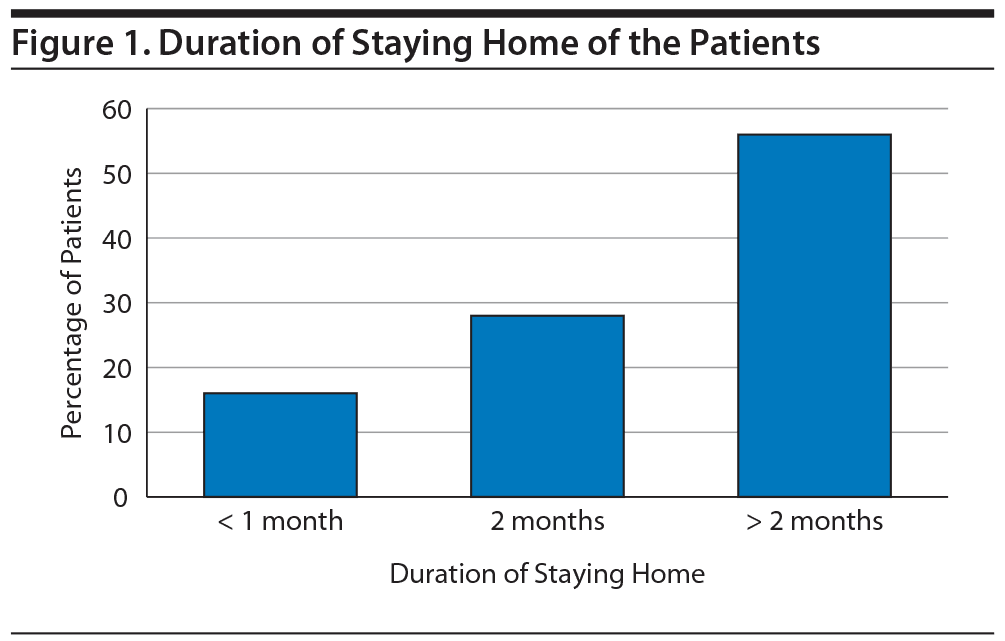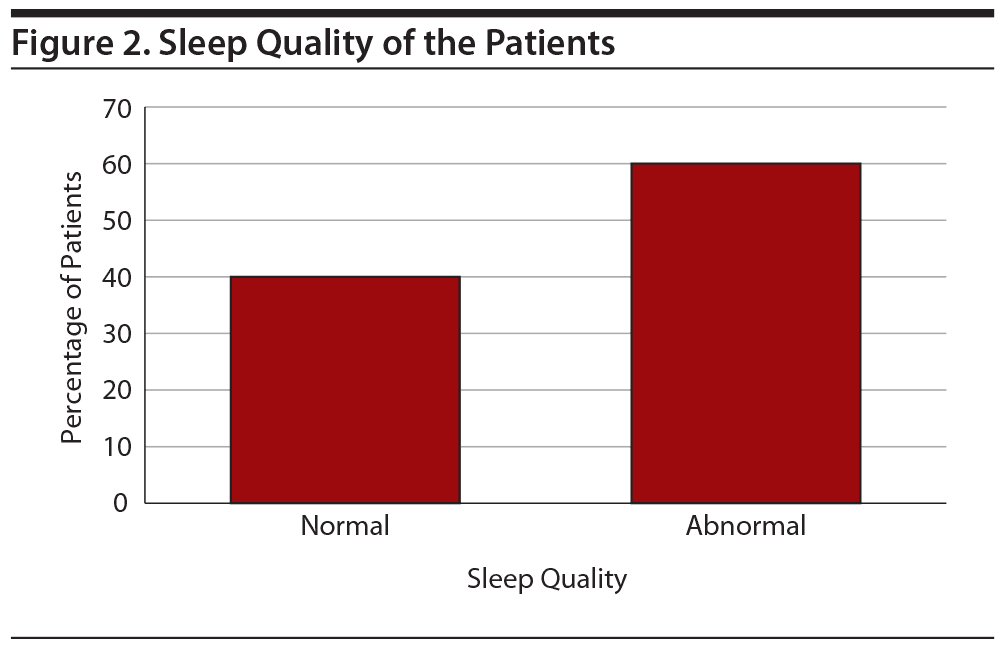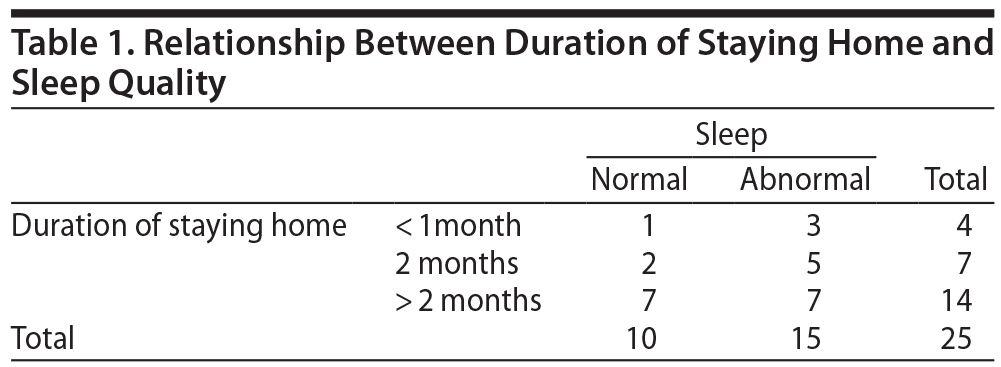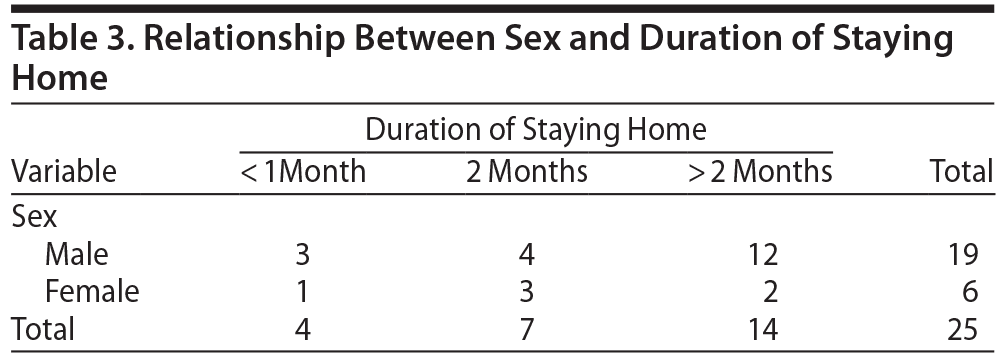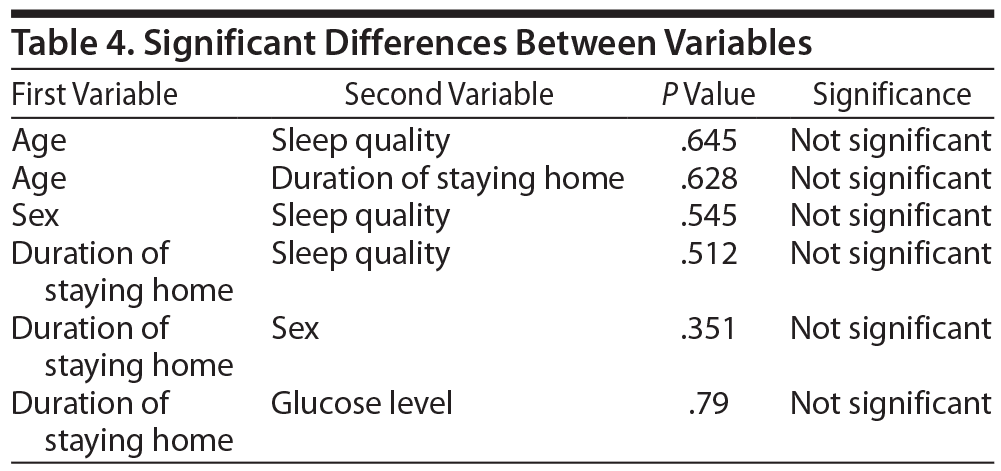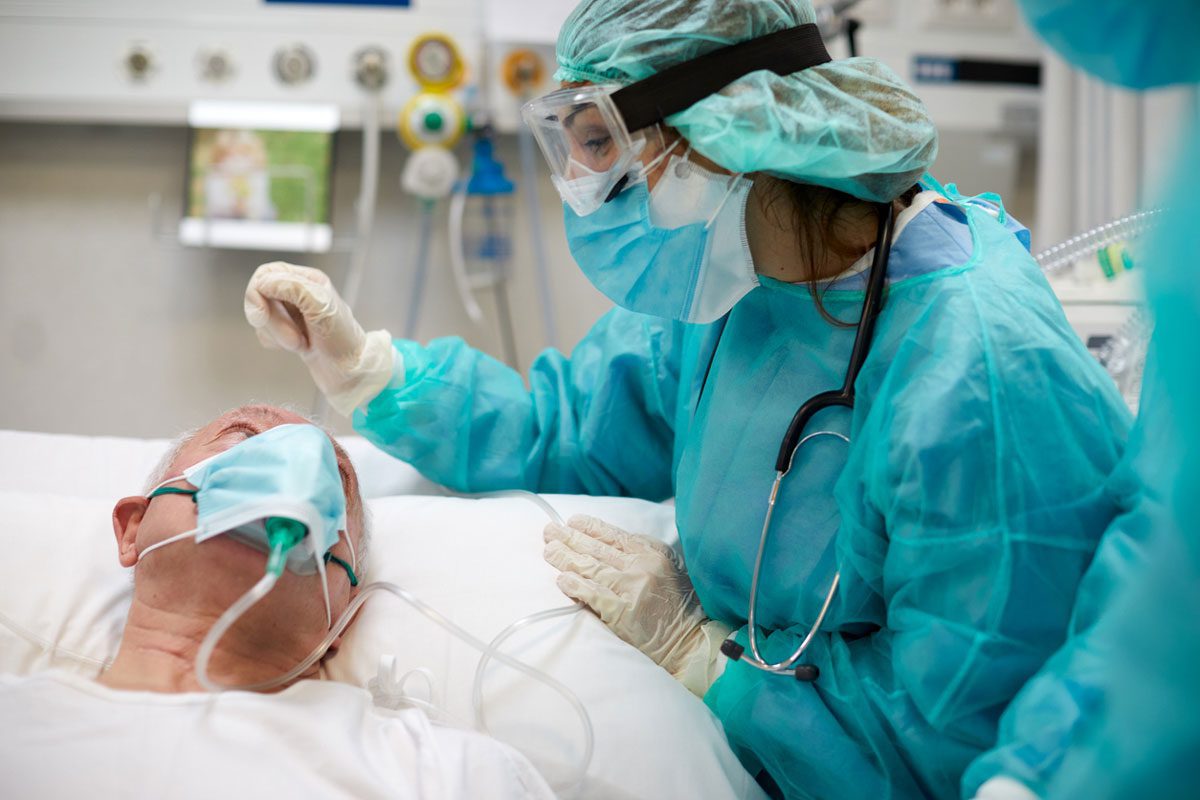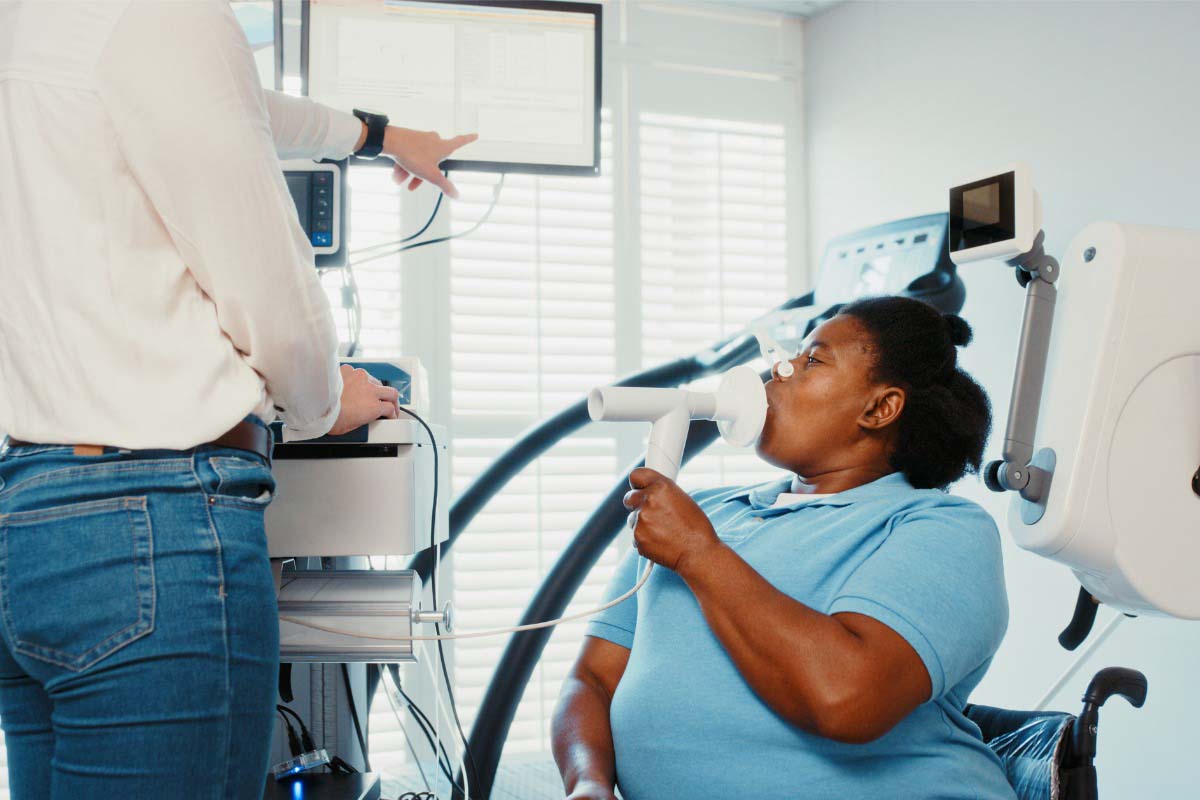Background: Due to the coronavirus 2019 (COVID-19) pandemic, many activities have stopped and individuals have been forced to stay at home for prolonged periods, which can have a negative impact on overall health and trigger stress and psychological disorders such as depression and anxiety. The objective of this study was to highlight 25 cases of unusual frequent urination associated with abnormal sleep and their relation to staying at home for a prolonged period due to the COVID-19 crisis.
Methods: This retrospective cross-sectional study included 25 patients who complained of frequent urination (> 3 times/hour) and abnormal sleep during the last 4 months (January-April 2020). These patients were evaluated for all possible differential diagnoses.
Results: All of the patients had frequent urination > 10 times/day and abnormal sleep but had normal kidney function tests and other investigations. None of the patients had been doing any physical activity at home. All of the patients said that both sleep and urination frequency improved after leaving home for a while (eg, to visit friends, walk, or play sports). This improvement occurred within 2 nights of leaving the home; however, the majority of patients improved after the first night.
Conclusions: "Home staying syndrome" is an undefined syndrome of unusual symptoms of abnormal sleep (altering sleep time and duration) and frequent urination > 3 times/hour. This syndrome is associated with staying at home for a long period of time and is easily resolved by doing any activity such as sports or visiting friends. While this syndrome is rare, it may be more prevalent now due to the COVID-19 pandemic, which forces people to stay home for infection prevention.

Association Between Frequent Urination and Prolonged Staying at Home
ABSTRACT
Background: Due to the coronavirus 2019 (COVID-19) pandemic, many activities have stopped and individuals have been forced to stay at home for prolonged periods, which can have a negative impact on overall health and trigger stress and psychological disorders such as depression and anxiety. The objective of this study was to highlight 25 cases of unusual frequent urination associated with abnormal sleep and their relation to staying at home for a prolonged period due to the COVID-19 crisis.
Methods: This retrospective cross-sectional study included 25 patients who complained of frequent urination (> 3 times/hour) and abnormal sleep during the last 4 months (January-April 2020). These patients were evaluated for all possible differential diagnoses.
Results: All of the patients had frequent urination > 10 times/day and abnormal sleep but had normal kidney function tests and other investigations. None of the patients had been doing any physical activity at home. All of the patients said that both sleep and urination frequency improved after leaving home for a while (eg, to visit friends, walk, or play sports). This improvement occurred within 2 nights of leaving the home; however, the majority of patients improved after the first night.
Conclusions: "Home staying syndrome" is an undefined syndrome of unusual symptoms of abnormal sleep (altering sleep time and duration) and frequent urination > 3 times/hour. This syndrome is associated with staying at home for a long period of time and is easily resolved by doing any activity such as sports or visiting friends. While this syndrome is rare, it may be more prevalent now due to the COVID-19 pandemic, which forces people to stay home for infection prevention.
Prim Care Companion CNS Disord 2020;22(5):20m02694
To cite: Hashim HT. Association between frequent urination and prolonged staying at home. Prim Care Companion CNS Disord. 2020;22(5):20m02694.
To share: https://doi.org/10.4088/PCC.20m02694
© Copyright 2020 Physicians Postgraduate Press, Inc.
aUniversity of Baghdad-College of Medicine, Baghdad, Iraq
*Corresponding author: Hashim Talib Hashim, MD, University of Baghdad-College of Medicine, 400 St, Nassiryah, Dhi Qar, Iraq 64001 ([email protected]).
Prolonged staying at home for longer than usual has a negative impact on the mind and overall health1 and can trigger psychological disorders such as depression, anxiety, and stress.2 Prolonged staying at home also produces insomnia and loss of interest in life and activities that the person used to engage in, as it hinders thinking and interaction.3
Frequent urination is one of the most significant signs of urinary system disease and can also be an indicator for metabolic diseases such as diabetes mellitus, as well as stress and brain tumors.4-6Two hormones in the body that control urination are aldosterone, which is secreted from the adrenal gland, and the antidiuretic hormone (ADH), which is secreted from the pituitary gland.7 Any abnormality with these 2 hormones will cause irregularity in the frequency of urination, and many blood pressure medications, such as angiotensin converting enzyme inhibitors and angiotensin II receptor blockers, work by acting on the receptor of these hormones.8,9
Here, 25 cases of unusual frequent urination associated with abnormal sleep and their relationship to prolonged staying at home during the coronavirus disease 2019 (COVID-19) pandemic are reported.
METHODS
This retrospective cross-sectional study included 25 patients who presented to the clinic with complaints of frequent urination (> 3 times/hour) and abnormal sleep during the last 4 months (from January-April 2020). A full history was taken from the patients, and medical records (if available) were reviewed carefully. Demographic data, physical examination results, and clinical outcomes were assessed. Sleep quality was evaluated according to the recorded sleep history (time of sleep, time of wake up, and number of sleep interruptions during the night).
The following tests were conducted to exclude other causes of frequent urination and sleep abnormalities:
All patients provided informed consent to share medical data related to their case. Ethical approval was obtained from the ethics committee of the University of Baghdad-College of Medicine, Baghdad, Iraq. The data were analyzed with SPSS version 25 (IBM Corp, Armonk, New York). Significance was assessed with t test and χ2; P < .05 was considered statistically significant with a confidence interval of 95%.
RESULTS
The mean ± SD age of the patients was 28.24 ± 7.38 years (range, 20-45 years). Of the participants, 76% were male (19 cases) and 24% were female (6 cases). All patients had blood pressure and blood glucose (109.27 ± 8.99 mmol/L) levels within normal limits, as well as normal blood tests. None of the participants had significant renal disease or impairment. All of the patients had frequent urination > 10 times/day, and the amount of urination was small to moderate depending on the patient’s assessment.

- Frequent urination with no significant cause in individuals staying home for a prolonged period of time suggests a new syndrome of symptoms predominated by abnormal sleep quality.
- Home staying syndrome can be easily resolved by doing sports, visiting friends, and getting out of the home.
- Home staying syndrome is rare but may be more prevalent due to the COVID-19 pandemic, which forces people to stay home for infection prevention.
Figure 1 and Figure 2 illustrate the duration of staying home and sleep quality among the patients. Staying home for a duration > 2 months and abnormal sleep were predominant. Table 1, Table 2, and Table 3 show the relationship between duration of staying home and sleep quality, sex and sleep quality, and sex and duration of staying home, respectively. Abnormal sleep quality was high in those who stayed home > 2 months, and men were more affected than women. Table 4 shows differences between variables.
All of the patients reported that their condition improved after leaving home for a while (eg, visiting friends, walking, or playing sports). This improvement occurred within 2 nights of leaving the home; however, the majority of patients improved after the first night. None of the patients had been doing any sports or physical activity at home.
DISCUSSION
Frequency of urination with no significant cause found in this study suggests a new syndrome of symptoms predominated by abnormal sleep quality or sleep problems. Given that diabetes mellitus, high blood pressure, and other conditions were excluded, the cause of frequent urination in these patients appears to be psychological. Staying at home for long periods of time can evoke anxiety and depression, and secretion of ADH will stop as a result; however, ADH levels were within normal limits in all the cases presented here. In this study, 100% of the patients’ symptoms resolved after getting out of the home to walk, visit friends, or play sports. There was no significant difference between any 2 variables among the 25 cases, which indicates that this process is not a result of any cause or factor that could be controlled. Disruption of sleep and being up too late during the night can alter the circadian rhythm, which can alter the normal physiology of many bodily functions including the urination process. Therefore, "home staying syndrome" is an undefined disorder of unusual symptoms of abnormal sleep (altering sleep time and duration) and frequent urination > 3 times in 1 hour that results from staying at home for a long period of time with no activity.
CONCLUSION
Home staying syndrome can be easily resolved by doing sports, visiting friends, and getting out of the home. This syndrome is rare but may be more prevalent now due to the COVID-19 pandemic, which forces people to stay home for infection prevention.
Submitted: May 28, 2020; accepted June 26, 2020.
Published online: September 24, 2020.
Potential conflicts of interest: None.
Funding/support: None.
REFERENCES
1. Benatti FB, Ried-Larsen M. The effects of breaking up prolonged sitting time: a review of experimental studies. Med Sci Sports Exerc. 2015;47(10):2053-2061. PubMed CrossRef
2. Studebaker CD, Murphy BP. Prolonged sitting: current concepts on the physiological effects of seated postures at work. Prof Saf. 2014;59(9):42-48.
3. Pronk N. The problem with too much sitting: a workplace conundrum. ACSM’s Health and Fitness Journal. 2011;15(1):41-43. CrossRef
4. Samy AN, Shaath M. Expert system urination problems diagnosis. World Wide Journal of Multidisciplinary Research and Development. 2016;2:9-19.
5. Chiew YW, Yang CS. Disabling frequent urination in a young adult: ketamine-associated ulcerative cystitis. Kidney Int. 2009;76(1):123-124. PubMed CrossRef
6. Stormorken H, Brosstad F. Frequent urination—an important diagnostic marker in fibromyalgia [in Norwegian]. Tidsskr Nor Laegeforen. 2005;125(1):17-19. PubMed
7. Shimizu T, Shimizu S, Higashi Y, et al. A stress-related peptide bombesin centrally induces frequent urination through brain bombesin receptor types 1 and 2 in the rat. J Pharmacol Exp Ther. 2016;356(3):693-701. PubMed CrossRef
8. Scott JH, Mohammed A, Dunn RJ. Physiology, Aldosterone. Treasure Island, FL: StatPearls Publishing; 2020.
9. Tolordava G, Yagudina R, Arinina E. PCV45—budget impact analysis of ACEI and ARBS II drugs in patients with arterial hypertension. Value Health. 2018;21(suppl 3):S100. CrossRef
Enjoy this premium PDF as part of your membership benefits!
